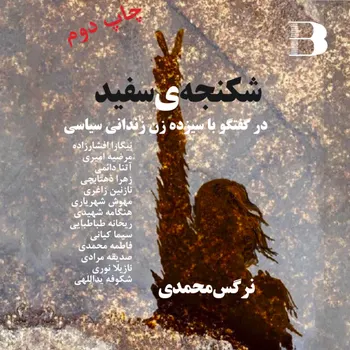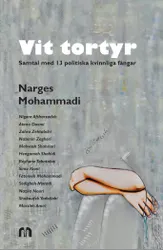Nigara Afsharzadeh, Atena Daemi, Zahra Zehtabchi, Nazenin Zagheri, Mahvash Shahriari, Hengameh Shahidi, Reyhane Tabatabaei, Sima Kinai, Fatemeh Mohammadi, Sedigheh Moradi, Nazila Nouri, Shokoufeh Yadollahi, Marzieh Amiri, Narges Mohammadi. There are many stories about the harsh existence of political prisoners in Iranian prisons. But it has never been told like this. "White Torture" takes us to the darkest corner of the isolation cell as fourteen different women provide us with a direct glimpse into life behind the prison walls and its unjust and inhumane system. These 14 women come from diverse political, religious, and ideological backgrounds, whose only common denominator is that they have been arrested due to their activism and dissent. They have been accused of so-called "thought crimes"; that is, crimes against what one is allowed to think, feel, and say. In other words, the most fundamental aspects of being human. "White Torture" is not about numbers, statistics, or Iran's role in the world. It is about human lives. About women. About sisterhood and motherhood. And about lives shattered and dreams crushed through arbitrary arrests, a life of constant oppression, and psychological and physical torture. But it is also a book about hope. Because no matter how terrifying power tries to be, books continue to be written, stories continue to be told, and thoughts of change and a better future persist. "White Torture" is written by Iranian human rights activist Narges Mohammadi and is based on thirteen personal interviews with fellow inmates whom Mohammadi met during her time in prison. She also writes about her own experience, thus becoming the book's fourteenth voice. Two months after "White Torture" was published in Persian, Mohammadi was released after eight years in prison. In November 2021, Narges was arrested again on false charges and has since been imprisoned. Narges has been awarded several international prizes, including the PEN America, Olof Palme Prize, and UNICEF Prize.
Vit Tortyr (Persiska)
Author:
Duration:
- 208 pages
Language:
English
Categories:
- 3 books
Narges Mohammadi
Narges Mohammadi is Vice President of the Defenders of Human Rights Center. A professional engineer, she lost her post in 2009, following a jail sentence. As a journalist, she wrote many articles arguing for social reforms in Iran and published an essay collection, The Reforms, the Strategy, and the Tactics. She campaigns for the abolition of the death penalty, women’s rights and the right to protest. She has spent over eight years in Iranian prisons and has been incarcerated since November 2021 – the same year she was nominated for the Nobel Peace Prize. Her work has been praised by Amnesty International, Reporters Without Borders, and PEN. Her documentary White Torture won an award for reportage at the International Film Festival and Human Rights’ Forum. Her family now lives in France.
Read more


